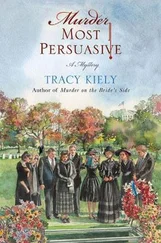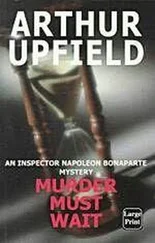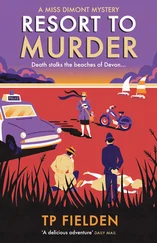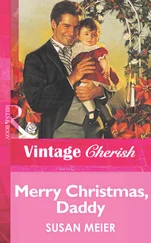Customers paid their 50 pence to Disaster in the Elfin Grove, and then the child—usually alone—was propelled through the door of the booth and into the presence of Father Christmas, who sat in his canvas-backed director’s chair on a small dais facing the entrance, with his sack of toys beside him. The child climbed onto his knee, whispered its Christmas wishes, and was rewarded with a few friendly words and a small gift from Santa’s sack.
What was not obvious to the clientele was the back entrance to the booth, which enabled Father Christmas to slip in and out unobserved. He usually had his coffee break at about 11:15, unless there was a very heavy rush of business. Disaster would pick a moment when custom seemed slow, put up the CLOSED notice, and inform Bert that he could take a few minutes off. When he returned, he pressed a button by his chair that rang a buzzer in the cashier’s booth. Down would come the notice, and Santa was in business again.
Before Superintendent Armitage could comment on my remarks, Mr. Harrington broke into a sort of despairing wait. “It must have been one of the customers!” he cried.
“I don’t think so. sir.” said Armitage. “This is an inside job. He was stabbed in the back with a long thin blade of some sort. The murderer must have opened the back flap and stabbed him clean through the canvas back of his chair. That must have been someone who knew the exact arrangements. The murderer then used the back way to enter the booth—”
“I don’t see how you can say that!” Harrington’s voice was rising dangerously. “If the man was stabbed from outside, what makes you think anybody came into the booth?”
“I’ll explain that in a minute, sir.”
Ignoring Armitage, Harrington went on. “In any case, he wasn’t our regular Father Christmas! None of us had ever seen him before. Why on earth would anybody kill a man that nobody knew?”
Armitage and the deputy manager exchanged glances. Then Armitage said. “I knew him, sir. Very well. Charlie Burrows was one of our finest plainclothes narcotics officers.”
Mr. Harrington had gone green. “You mean—he was a policeman?”
“Exactly, sir. I’d better explain. A little time ago we got a tipoff from an informer that an important consignment of high-grade heroin was to be smuggled in from Hong Kong in a consignment of Christmas toys. Teddy bears, in fact. The drug was to be in the Barnum and Thrums carton, hidden inside a particular Teddy bear, which would be distinguished by having a blue ribbon around its neck instead of a red one.”
“Surely,” I said, “you couldn’t get what you call an important consignment inside one Teddy bear, even a big one.”
Armitage sighed. “Shows you aren’t familiar with the drug scene, sir,” he said. “Why, half a pound of pure high-grade heroin is worth a fortune on the streets.”
With a show of bluster Harrington said. “If you knew this, Superintendent, why didn’t you simply intercept the consignment and confiscate the drug? Look at the trouble that’s been—”
Armitage interrupted him. “If you’d just hear me out, sir. What I’ve told you was the sum total of our information. We didn’t know who in Barnum’s was going to pick up the heroin, or how or where it was to be disposed of. We’re more interested in getting the people—the pushers—than confiscating the cargo. So I had a word with Mr. Andrews here, and he kindly agreed to let Charlie take on the Father Christmas job. And Charlie set a little trap. Unfortunately, he paid for it with his life.” There was an awkward silence.
He went on. “Mr. Andrews told us that the consignment had arrived and was to be unpacked today. We know that staff get first pick, as it were, at new stock, and we were naturally interested to see who would select the bear with the blue ribbon. It was Charlie’s own idea to concoct a story about a special present for a little girl—”
“You mean, that wasn’t true?” Harrington was outraged. “But I spoke to the customer myself!”
“Yes, sir. That’s to say, you spoke to another of our people, who was posing as the little girl’s father.”
“You’re very thorough,” Harrington said.
“Yes, sir. Thank you, sir. Well, as I was saying, Charlie made a point of selecting the bear with the blue ribbon and taking it off in his sack. He knew that whoever was picking up the drop would have to come and get it—or try to. You see, if we’d just allowed one of the staff to select it, that person could simply have said that it was pure coincidence—blue was such a pretty color. Difficult to prove criminal knowledge. You understand?”
Nobody said anything. With quite a sense of dramatic effect Armitage reached down into Santa’s sack and pulled out a Teddy bear. It had a blue ribbon round its neck.
In a voice tense with strain Mr. Andrews said, “So the murderer didn’t get away with the heroin. I thought you said—”
Superintendent Armitage produced a knife from his pocket. “We’ll see,” he said. “With your permission, I’m going to open this bear.”
“Of course.”
The knife ripped through the nobbly brown fabric, and a lot of stuffing fell out. Nothing else. Armitage made a good job of it. By the time he had finished, the bear was in shreds: and nothing had emerged from its interior except kapok.
Armitage surveyed the wreckage with a sort of bleak satisfaction. Suddenly brisk, he said, “Now. Which staff members took bears from the stockroom this morning?”
“I did,” I said at once.
“Anybody else?”
There was a silence. I said, “I believe you took two, didn’t you, Mr. Harrington?”
“I... em... yes, now that you mention it.”
“Miss MacArthur took one,” I said. “It was she who unpacked the carton. She said that Dis—Miss Aster—was going to take one.”
“I see.” Armitage was making notes. “I presume you each signed for your purchases, and that the bears are now with your things in the staff cloakroom.” Without waiting for an answer he turned to me. “How many of these people saw Burrows select the bear with the blue ribbon?”
“All of us,” I said. “Isn’t that so, Mr. Harrington?”
Harrington just nodded. He looked sick.
“Well, then,” said Armitage, “I shall have to inspect all the bears that you people removed from the stockroom.”
There was an element of black humor in the parade of the Teddies, with their inane grins and knowing, beady eyes: but as one after the other was dismembered. nothing more sensational was revealed than a growing pile of kapok. The next step was to check the stockbook numbers—and sure enough, one bear was missing.
It was actually Armitage’s Sergeant who found it. It had been ripped open and shoved behind a pile of boxes in the stockroom in a hasty attempt at concealment. There was no ribbon round its neck, and it was constructed very differently from the others. The kapok merely served as a thin layer of stuffing between the fabric skin and a spherical womb of pink plastic in the toy’s center. This plastic had been cut open and was empty. It was abundantly clear what it must have contained.
“Well,” said the Superintendent, “it’s obvious what happened. The murderer stabbed Burrows, slipped into the booth, and substituted an innocent Teddy bear for the loaded one, at the same time changing the neck ribbon. But he—or she—didn’t dare try walking out of the store with the bear, not after a murder. So, before Charlie’s body was found, the murderer dismembered the bear, took out the heroin, and hid it.” He sighed again. “I’m afraid this means a body search. I’ll call the Yard for a police matron for the ladies.”
It was all highly undignified and tedious, and poor old Disaster nearly had a seizure, despite the fact that the police matron seemed a thoroughly nice and kind woman. When it was all over, however, and our persons and clothing had been practically turned inside out, still nothing had been found. The four of us were required to wait in the staff restroom while exhaustive searches were made for both the heroin and the weapon.
Читать дальше












